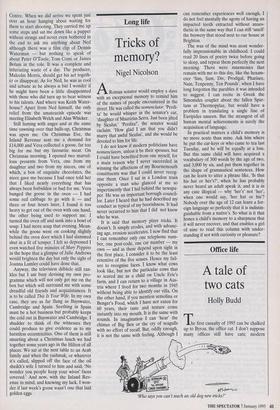Long life
Tricks of memory?
Nigel Nicolson
ARoman senator would employ a slave with an exceptional memory to remind him of the names of people encountered in the street. He was called the nomenclator. 'Perdi- ta' he would whisper in the senator's ear, `daughter of Maurizius Serra. Just been jilted by Siculus.' Terditar, the senator would exclaim. 'How glad I am that you didn't many that awful Siculus', and she would be devoted to him for life.
I do not know if modern politicians have nomenclators, unless it be their spouses, but I could have benefited from one myself, for a main reason why I never succeeded in winning the affections of my Bournemouth constituents was that I could never recog- nise them. Once I sat in a London train opposite a man who glanced at me so impertinently that I hid behind the newspa- per. He was an important borough council- lor. Later I heard that he had described my conduct as typical of my boorishness. It had never occurred to him that I did not know who he was.
It is said that memory plays tricks. It doesn't. It simply erodes, and with advanc- ing age, erosion accelerates. I now find that I can remember only one telephone num- ber, one post-code, one car number — my own — and as these depend upon sight in the first place, I consider it to be the least retentive of the five senses. Hence my fail- ure to recognise faces. I know what cows look like, but not the particular cows that so scared me as a child on Uncle Eric's farm, and I can return to a village in Aus- tria where I lived for two months in 1945 without being able to identify our villa. On the other hand, if you mention semolina or Benger's Food, which I have not eaten for 60 years, their taste and texture come instantly into my mouth. It is the same with sounds. In imagination I can 'hear' the chimes of Big Ben or the cry of seagulls with no effort of recall. But, oddly enough, it is not the same with feeling. Although I can remember experiences well enough, I do not feel mentally the agony of having an impacted tooth extracted without anaes- thetic in the same way that I can still 'smell' the brewery that stood next to our house at Brighton.
The wax of the mind was most wonder- fully impressionable in childhood. I could read 20 lines of poetry twice before going to sleep, and repeat them perfectly the next morning. There were mnemonics that remain with me to this day, like the hexam- eter 'Sim, Sam, Div, Prodigal, Pharisee, Nain, Tenpenny, Ten Pounds', when I have long forgotten the parables it was intended to suggest. I can recite in Greek the Simonides couplet about the fallen Spar- tans at Thermopylae, but would have a problem in translating a single line of Euripides unseen. But 'the strangest of all human mental achievements is surely the acquisition of language.
In practical matters a child's memory is no more acute than mine. Ask him where he put the car-keys or who came to tea last Tuesday, and he will be equally at a loss. But this same child will have acquired a vocabulary of 300 words by the age of two, and 3,000 by six, and put them together in the shape of grammatical sentences. How can he learn to utter a phrase like, 'Is that his hat or her's?', when he has probably never heard an adult speak it, and it is in any case illogical — why 'her's' not 'her', when one would say, 'her hat or his'? Nobody over the age of 12 can learn a for- eign language so perfectly that it is indistin- guishable from a native's. So what is it that hones a child's memory to a sharpness that it will never recover, and that enables a girl of nine to read this column with under- standing if not with curiosity or pleasure?


















































 Previous page
Previous page